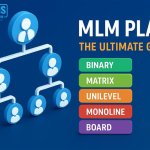Multi-Level Marketing (MLM) and the components associated with it. MLM operates on a structure where individuals earn commissions from their sales and those made by their recruited downline. Here’s a detailed breakdown:
Understanding MLM:
- Potential for Income: MLM can offer high income potential, but success varies. Earnings arise from commissions, bonuses, and downline sales.
- Building a Downline: Success often depends on growing and retaining a robust downline structure.
- Challenges: Requires dedication, sales skills, and team motivation.
- Controversy: MLM has faced skepticism due to aggressive tactics. Research and choose reputable companies.
Earning through MLM Websites:
- Website Creation: Creating MLM websites can offer opportunities. These platforms support product showcasing, recruitment, sales tracking, and team management.
- Earning Services: Offer services related to designing, developing, or maintaining MLM sites.
- Affiliate Marketing: Promote tools or resources aiding MLM businesses and earn through referrals.
Before Venturing into MLM:
- Thorough Research: Understand the company, niche, legal, and ethical aspects.
- Solid Business Plan: Develop a plan factoring in challenges and risks.
Multi-Level Marketing ( MLM) Plans:
Each MLM plan comes with its unique structure and commission schemes:
- Binary Plan: In this plan, each member recruits and sponsors two other members into the first level, forming two legs (left and right). Commissions often revolve around pairs or matching bonuses, encouraging balanced growth in the downline.
- Board Plan: Members fill spots in a board or matrix, and upon completing a board cycle, they receive bonuses. This cycle repeats, and participants move through different boards with potential bonuses at each stage.
- Monoline Plan: Also known as a single-line plan, it operates on a single leg or line, and members earn based on the overall volume or sales within that line. This plan emphasizes a single line of recruits.
- Matrix Plan: Structured in a matrix or grid format specifying width and depth, this plan determines the number of members on each level. Commissions often relate to filling matrix positions, encouraging spillover and teamwork.
- Unilevel Plan: In this plan, members can sponsor an unlimited number of distributors in their front line, leading to depth. Commissions are based on various levels, typically down several generations, encouraging team building and depth in the network.
Each plan has its strengths and appeals to different network marketing strategies. They often have specific commission types associated with them, such as affiliate or referral commissions, level or pair commissions, fast bonuses, regular bonuses, or royalty bonuses.
Implementing these plans within an e-commerce environment requires specialized MLM software or custom development to handle the intricacies of compensation structures, tracking sales, managing downlines, and calculating commissions specific to each plan’s requirements. Integrating these MLM functionalities into an e-commerce website involves a thorough understanding of the chosen plan and its associated commission types.
Integration Platforms for MLM Websites:
Each of these platforms has its strengths in integrating MLM functionalities within an e-commerce setting:
- WordPress: Known for its flexibility and plugin ecosystem, WordPress can integrate MLM functionalities using plugins like WooCommerce combined with MLM-specific plugins. These plugins help manage sales, commissions, downline structures, and member management within an e-commerce framework.
- Drupal: Drupal’s customization capabilities allow for tailored MLM solutions. With Drupal Commerce modules and custom development, it’s possible to build an MLM e-commerce site with various compensation plans and network structures.
- Magento: A dedicated e-commerce platform, Magento, can incorporate MLM functionalities through custom extensions or integrations. Specific modules or custom development might be needed to manage MLM features within the Magento framework.
- LearnPress: Primarily an e-learning plugin for WordPress, LearnPress can be extended to support MLM features for educational platforms that include e-commerce elements or member-based structures.
- OpenCart: Offering e-commerce solutions, OpenCart can be customized or extended with MLM plugins or modules to accommodate MLM functionalities alongside its e-commerce capabilities.
- Laravel (with Python integration): Laravel, as a PHP framework, can serve as a solid foundation for developing custom MLM functionalities integrated with e-commerce features. Laravel for backend processes, data analysis, or automation within the MLM e-commerce site.
- Python: Although not a typical web development platform like the others, Python’s versatility allows it to handle backend operations, data processing, or API integrations that enhance the MLM functionalities within an e-commerce environment developed on any of these platforms.
Each platform has its own ecosystem of plugins, modules, or customization options that can be leveraged to integrate MLM features into an e-commerce website. The choice depends on factors like the specific requirements of the MLM structure, scalability, customizability, and the familiarity or expertise of the developers working on the project.
Features in MLM E-Commerce Website:
In an MLM e-commerce website, various commission types play crucial roles in incentivizing sales and building the network:
- Affiliate or Referral Commission: Earned by members for referring or recruiting new participants to the network. This commission is usually a percentage of the sales made by the recruited members.
- Join Commission: A bonus or commission earned when a new member joins the MLM network. It’s typically a one-time bonus upon enrollment.
- Level or Pair Commission: In some plans like Binary or Matrix, members earn bonuses or commissions based on achieving specific levels or pairs within the structure. For instance, in Binary plans, bonuses are awarded for matched pairs within the downline.
- Company Commission: This commission is based on the overall company performance or sales targets. It could be a bonus paid to members if the company hits certain milestones or targets.
- Fast Bonus: Immediate bonuses or incentives given to members upon achieving specific criteria or targets quickly. It encourages swift action and performance.
- Regular Bonus: Scheduled bonuses based on consistent performance, often tied to sales targets or meeting certain requirements over a period.
- Royalty Bonus: Ongoing earnings based on the sales or activities of a member’s downline. It’s a form of continuous income derived from the performance of recruited members.
Implementing these commission types on an MLM e-commerce website requires a robust and integrated system that tracks sales, manages downlines, and calculates commissions accurately based on the predefined compensation plan. This integration usually involves specialized MLM software or custom development tailored to the chosen MLM plan’s requirements.










avv42i